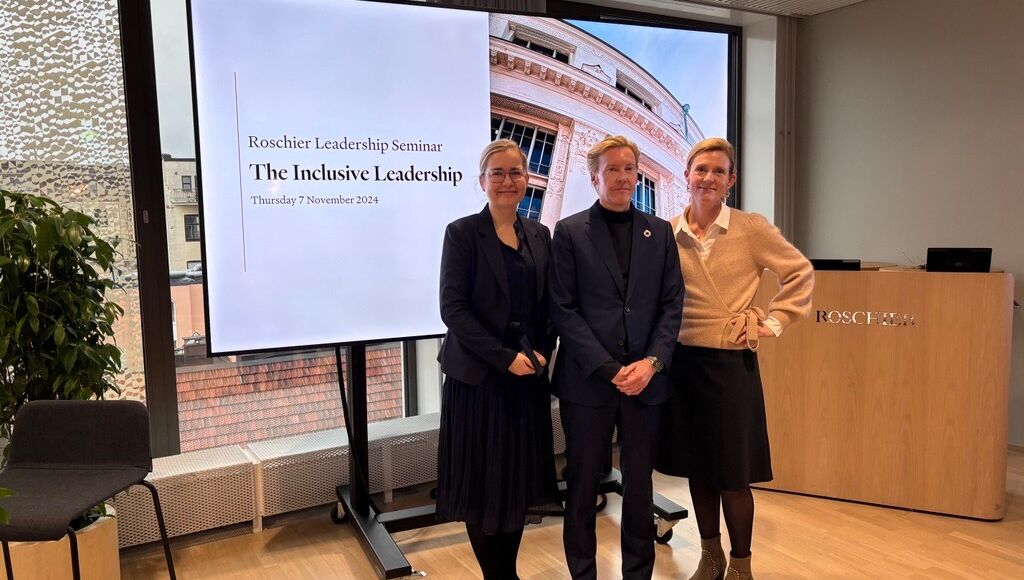
The inclusive leadership: Roschier Leadership Seminars
Insights|November 11, 2024
Last week, we welcomed Sami Pauni, Huhtamäki’s Corporate Affairs and Legal, Group General Counsel, and Member of the Global Executive Team, to share his insights on inclusive leadership. With his background and experience, he brings a unique and personal perspective to creating a more inclusive workplace.
Drawing from his own experiences, Sami Pauni understands the barriers that minority groups can face and advocates for a workplace centered on empathy, fairness, and open communication. In our leadership seminar in Helsinki last week, moderated by Christina Dahlblom, Sami shared his insights on fostering inclusivity in international settings, touching on the challenges and actions that can make workplaces supportive for everyone.
Main points from the discussion:
- Allyship: Leaders have a duty to stand up for minorities and advocate for their rights.
- Start small: Ensure everyone can take part in group discussions by using a common language.
- Challenge biases: Question assumptions about who can do certain roles.
- Take practical steps: Create safe, inclusive conditions, like providing transport for night shifts.
- Speak up: Silence can imply acceptance – open dialogue is essential.
Sami emphasized that his experiences have deepened his understanding of the difficulties minorities face in gaining equal opportunities. He noted that various groups – such as people over the age of 50, people from ethnic minorities, or those with differing sexual orientations – often encounter similar obstacles in finding and keeping jobs. These challenges can be influenced by cultural and generational differences, which shape how people approach and discuss minority issues. With political landscapes shifting, support for minority rights can also rapidly disappear. He stressed that silent acceptance of minorities can be interpreted as acceptance of inequality, making it crucial for leaders to speak up for change.
In his own career, Sami has experienced both support and challenges. Early on, a predecessor doubted his suitability for his role, but he found support among other colleagues. Today, Sami is proud that Huhtamäki has become more progressive, participating in Pride for the first time last year. He sees gestures like changing the company logo during Pride Month, as a meaningful commitment, even if it’s symbolic. His reasoning for this is that a logo is an important asset for a company’s bran image, and changing it signals that you are willing to be seen differently as a company.
Huhtamäki’s Diversity, Equity, and Inclusion (DEI) program is another way Sami and his colleagues are working toward a more inclusive environment. In Turkey, for example, the company introduced transportation for women working night shifts, ensuring they can travel safely without having to walk alone in the dark. Sami believes that practical solutions like this can make a significant difference in creating equitable workspaces and encourage higher participation from all groups. He also advocates for reconsidering biases around what types of roles certain people can or cannot do, emphasizing that assumptions based on age, gender, or background need to be challenged to create equal opportunities.
Sami is also mindful of the role language plays in inclusivity. He believes that ensuring everyone can understand and participate in conversations is key to fostering a supportive atmosphere. In a global company like Huhtamäki, this means encouraging the use of a common language in group settings so that no one feels excluded or left behind.
In Sami’s view, true inclusive leadership is more than just policy – it’s about building a culture where every individual, regardless of their background, can succeed. He emphasizes that leaders should both practice and demonstrate inclusivity in their actions. By breaking down biases, fostering open dialogue, and taking concrete steps to support minority groups, Sami’s vision of leadership offers a pathway to a more empathetic, inclusive, and equal workplace.
The Roschier Leadership Seminar series started in 2023. Please find the previous articles in the links below.
Caroline Farberger and Annie Lööf on value-based leadership
Peter Wallenberg Jr. and Lovisa Cavalli Wallenberg on leadership over time and generations
Hans Stråberg on ultimate leadership
Ambassador Judith Gough on the art of diplomacy
Ice hockey legend and Olympic gold medalist Mats Sundin on sustainable leadership
Ambassadors Wegger Strømmen, Nicola Clase, and Jakob Nymann-Lindegren on diplomatic leadership
Eija Hakakari and Julia Macharey on outdated leadership
Lena Eliasson and Jessica Häggström continue on outdated leadership